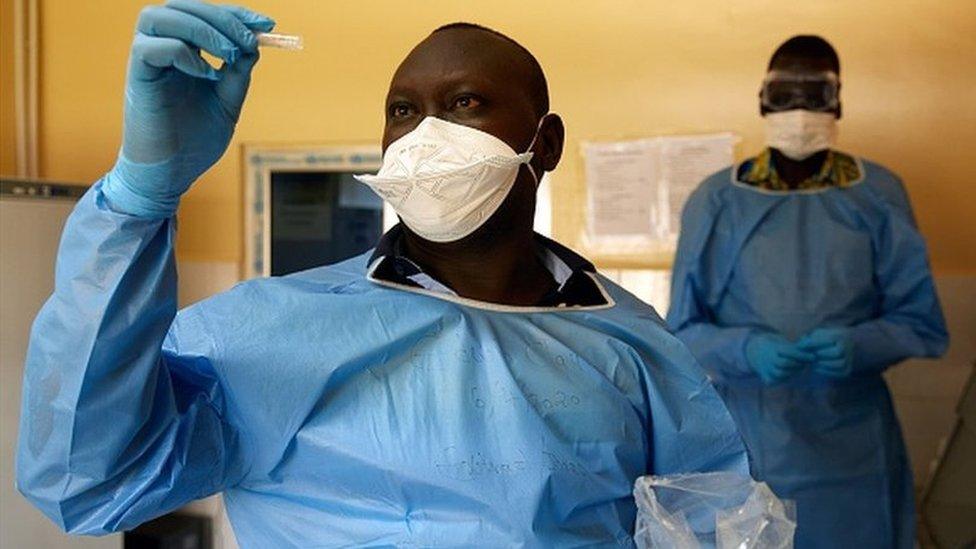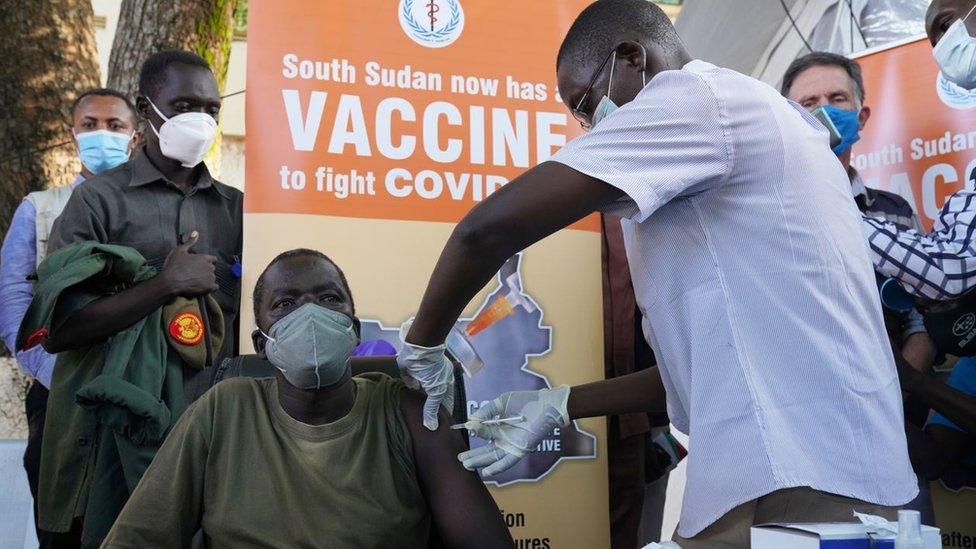Are South Sudan officials getting proper Covid tests?
- Published

A lab technician analyses a patient's test sample
An investigation by South Sudan's government has found that senior officials may not have tested properly for Covid-19 before travelling overseas.
President Salva Kiir was forced to cancel a trip to Qatar in November after several members of his staff who went ahead of him tested positive for the virus when they arrived.
An investigation by the South Sudan government revealed that many senior officials were directing the lab technicians to only do an oral swab and not the intended combination of oral and nasal swabs. This could result in a false negative reading.
In response to the Doha incident, Vice-President Hussein Abdelbag made an announcement on state TV, which raised suspicions as he spoke of the need to "end the habits of travelling without a Covid-19 certificate" and vowed that he would hold any health facility that is responsible for issuing fake certificates accountable.
Following the vice-president's broadcast, local media began reporting that the officials had set off from the capital, Juba, armed with fake certificates that said they had tested negative for coronavirus.
Ayaga Garang Deng from the vice-president's office denied that the vice-president's announcement was an admission of misconduct but said there was concern that some government officials had travelled without taking the Covid test. He also told the BBC that the incident was a national embarrassment to the country, and was being investigated.
It is not clear if this means that the officials did not take the test at all, or did not take it correctly.
New system to prevent fake certificates
Ministry of Health spokesman Mabior Kiir Kudior told the BBC that the officials who went to Qatar had not used fake certificates to travel.
However, the reported use of fake Covid-19 certificates has been a long-running issue in South Sudan, so much so that the Ministry of Health issued a temporary suspension on the production of Covid-19 certificates in June last year, and introduced a new electronic system to combat the problem.
The new system uses QR codes and barcodes to make it harder to falsify certificates.
Med Blue, a laboratory close to the main airport in Juba, was one of the first private clinics in South Sudan to be tasked with screening for Covid-19.
According to Eye Radio, earlier this year travellers were intercepted at the Ugandan border with fake Covid-19 certificates which allegedly depicted the Med Blue logo. Med Blue denies any links, and states that the document logos must have been forgeries.
Dr Poles Simon from Med Blue told the BBC that the new system included several checks: "All patients that attend a Med Blue lab for Covid-19 screening are required to produce ID to verify their identity. Information is centralised on a unified, electronic system, overseen by the government and cross-checked at the lab with identification documents before being combined with a unique barcode, containing the patient's test results."

This man is one of the lucky ones - South Sudan has one of the world's lowest vaccination rates
According to Dr Simon, Med Blue laboratories in the country undergo regular government spot checks to ensure the facilities pass quality control measures. He believes that the barcode system successfully eliminates any possibility of results being tampered with or falsified.
He went on to state that there are now eight other laboratories in the country that conduct Covid-19 screening and insisted its facility was not responsible for testing the government officials who tested positive in Doha: "Their certificates [for travel] were not issued from Med Blue."
South Sudan is deemed to be one of the world's five least developed countries, according to the Human Development Index, with vaccine programmes in the country facing many challenges including cost and accessibility.
As a result the country has one of the lowest rates of vaccination against Covid-19 in the world, with just 1.2% of the population fully vaccinated.
The South Sudanese government has pledged to continue efforts in its campaign to ensure that at least half the population is fully vaccinated by June 2022, Mr Deng told the BBC.